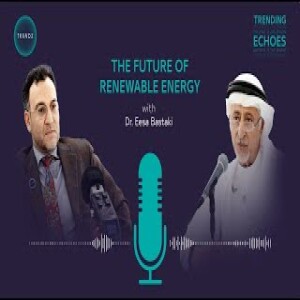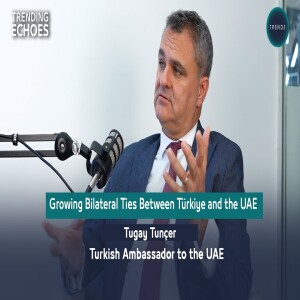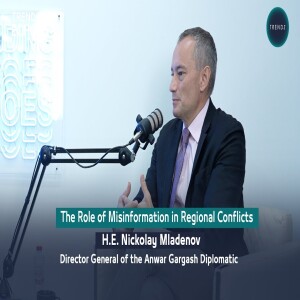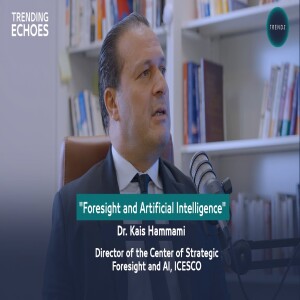Trending Echoes Podcast
Trending Echoes is a podcast series by Trends Research and Advisory that explores contemporary issues, emerging trends, and innovations shaping the world today. The podcast features expert guests from various fields—ranging from academia, policy, technology, and media—who provide in-depth insights on topics like global cooperation, artificial intelligence, and the future of content creation. Episodes often focus on how these trends affect societies, industries, and international relations, making it a platform for knowledge exchange and thoughtful discussions.
Episodes

Saturday Jan 25, 2025
Saturday Jan 25, 2025
الإعلام الرياضي والتعليم في الإعلام والتنافس الإعلامي الخليجي في المؤتمرات والمنتديات حلقة خاصة من #الكونغرس_العالمي_للإعلام2023 بالتعاون مع #ديوان_الملا مع الأستاذ عبدالله عبدالكريم الريسي المدير التنفيذي لقطاع المحتوى الإخباري بالإنابة "وام" @diwanalmulla

Saturday Jan 25, 2025
The Future of Renewable Energy with Dr. Eesa Bastaki | Ep#1
Saturday Jan 25, 2025
Saturday Jan 25, 2025
Dive into the world of climate action and energy transition with Trending Echos, your go-to podcast by Trends. Get Dr. Eesa's insights on #COP28, mitigation and more. #TrendingEchos #ClimateAction #ClimateChange

Sunday Jan 19, 2025
Sunday Jan 19, 2025
Trending Echoes Podcast brings you engaging discussions on global diplomacy, culture, and collaborations. Our honoured guest is His Excellency Tugay Tunçer, Ambassador of the Republic of Turkey to the UAE. In this episode, we delve into the evolving bilateral relations between the UAE and Turkey, exploring key topics such as:Strategic defence and security partnerships, including collaborations between Baykar Tech and Edge.Economic ties under the Comprehensive Economic Partnership Agreement aim to boost trade from $2.2 billion to $40 billion in five years.Integration of renewable energy and clean technologies.Insights from COP28 in Dubai and its relevance to economic and geopolitical developments.Ambassador Tunçer sheds light on Turkey’s strategic vision, technological collaboration, and shared regional stability and prosperity aspirations.This is a must-watch discussion for anyone interested in UAE-Turkey relations and their growing impact on the Middle East and beyond.#TrendingEchoesPodcast #TürkiyeUAE #BilateralRelations #Diplomacy #GlobalPartnership #InternationalRelations #CulturalExchange #MiddleEastRelations #EconomicGrowth #globaltrends

Sunday Jan 12, 2025
Sunday Jan 12, 2025
Misinformation isn’t just a global issue; it’s a game-changer in regional conflicts. Join His Excellency Nickolay Mladenov as he unpacks the challenges and shares his expert perspective on navigating this pressing issue.

Sunday Jan 05, 2025
Sunday Jan 05, 2025
In this insightful episode, recorded at the University of Tokyo, we are joined by Dr. Kais Hammami, Director of the Center for Strategic Foresight and Artificial Intelligence at ICESCO. The discussion navigates the intersection of strategic foresight, artificial intelligence (AI), ethics, and global collaboration.Episode Highlights:Historical and Conceptual Insights:Explores the historical evolution of foresight in the West and Arab-Islamic worlds, with references to pioneers like Ibn Khaldun and Mahdi Elmandjra.Introduces strategic foresight as a tool to analyze historical, present, and future trends, focusing on planning and scenario-based approaches.AI Integration in Foresight:Examines how AI tools enhance foresight through data analysis, scenario simulation, and monitoring.Discusses the pivotal "Riyadh Charter on Ethics of Artificial Intelligence," emphasizing AI's governance, ethics, and practical applications in the Arab-Islamic world.Global Collaboration:ICESCO's partnerships with organizations like the United Nations and regional leaders such as Saudi Arabia, Oman, and the UAE.Highlights regional workshops and initiatives aimed at building AI literacy and foresight capabilities, particularly in Africa and the Islamic world.Youth Engagement:Youth participation in drafting the AI charter reflects ICESCO's commitment to fostering the next generation's involvement in shaping ethical AI applications.Programs aim to empower young people to imagine their futures using strategic foresight tools.Foresight and AI in Practical Applications:The role of AI in addressing future challenges in education, employment, and global governance.Concerns about the societal impacts of AI, such as dependency on technology, loss of critical thinking, and diminishing personal intelligence.The Arab World and Japan:Explores opportunities for collaboration between the Arab world and Japan, focusing on technology, cultural preservation, and economic strategies.Highlights Japan as a model for integrating modern innovation with traditional values.Key Takeaways:Strategic foresight and AI provide essential frameworks for navigating rapid global changes.Collaboration between regions and cultures is critical for ethical and sustainable development in AI and foresight.Empowering youth and enhancing global partnerships are vital steps toward shaping a balanced future.Listen now to explore how strategic foresight and AI are reshaping our understanding of tomorrow! Subscribe to Trending Echoes for more engaging conversations.#TrendingEchoes #StrategicForesight #ArtificialIntelligence #AIInnovation #ForesightAndAI #AICharter #YouthEmpowerment #EthicalAI #GlobalCollaboration #TechnologyAndHumanity #ArtificialIntelligenceEthics #JapanAndArabWorld #FutureScenarios #ISESCO #ArabWorldLeadership #ForesightEvolution #AIAndSociety #PodcastConversations #TechForGood #AIInEducation #CrossCulturalInnovation

Saturday Dec 28, 2024
Saturday Dec 28, 2024
In this enlightening episode of Trending Echoes, we are joined by Dr Khadija Farhan Al-Humaid, a distinguished figure in education and development, to discuss the pivotal role of nurturing in education and its impact on students' personal and academic growth.Dr. Al-Humaid holds extensive expertise in educational research and human development. Her career spans key roles in educational policy formation, curriculum design, and teacher training, with a strong focus on integrating cultural and moral values into modern education. She has worked extensively on programs that bridge the gap between traditional and contemporary educational practices to equip learners for the challenges of the 21st century. Dr. Al-Humaid is widely recognized for her research on fostering inclusive and nurturing learning environments that emphasize creativity, critical thinking, and emotional resilience.Dr. Al-Humaid sheds light on the significance of creating learning spaces that prioritize holistic development, enabling students to achieve their fullest potential and contribute positively to their communities.Watch now and join the conversation on how nurturing education can revolutionize learning!Subscribe to Trending Echoes for more thought-provoking discussions!

Monday Dec 23, 2024
Monday Dec 23, 2024
Trending Echoes dives deep into Sources of Terrorist Threats in Germany with Jassim Mohammed, Head of the European Center for Counter-Terrorism and Intelligence Studies. Don’t miss his expert insights on the challenges and evolving threats.

Sunday Dec 08, 2024
Sunday Dec 08, 2024
This episode features H.E. Saeed Al-Bahri Salem Al Ameri, Director General of the Abu Dhabi Agriculture and Food Safety Authority.We delve into the UAE's pioneering approach to food and water security, a topic of global importance. The discussion highlights the UAE's remarkable foresight in addressing food security over 20 years ago under the leadership of His Highness, the President of the UAE. Early directives led to the development of a comprehensive strategy, focusing on sustainable solutions despite challenges like limited agricultural land, scarce water resources, and high temperatures.The UAE's strategy includes maintaining strategic stockpiles of essential commodities and fostering robust partnerships with the private sector. By leveraging its mature infrastructure and regulations, the country has become a hub for investments in food production, storage, and distribution.On water security, the conversation reveals the UAE's innovative efforts to tackle low annual rainfall and reliance on desalinated water. These include cutting-edge research into technologies like graphite-based desalination, water extraction from air, rainwater harvesting, and replenishing underground reservoirs.The episode also explores the UAE's role as a global leader in sharing knowledge and solutions for food and water security. Through international platforms like World Food Week, the UAE brings together experts, governments, and private sectors to address challenges, exchange insights, and foster investment opportunities. Its resilience during crises, such as the COVID-19 pandemic, has positioned it as a model for others navigating resource scarcity.Join us to learn how the UAE transforms challenges into opportunities, setting a global standard for sustainability and innovation in securing food and water for future generations.#FoodSecurity #WaterSecurity #Sustainability #UAELeadership #AgricultureInnovation #GlobalPartnerships #ResilientFuture #FoodSafety #AbuDhabiAgriculture #KnowledgeSharing #ClimateSolutions #StrategicVision #sustainabledevelopment







